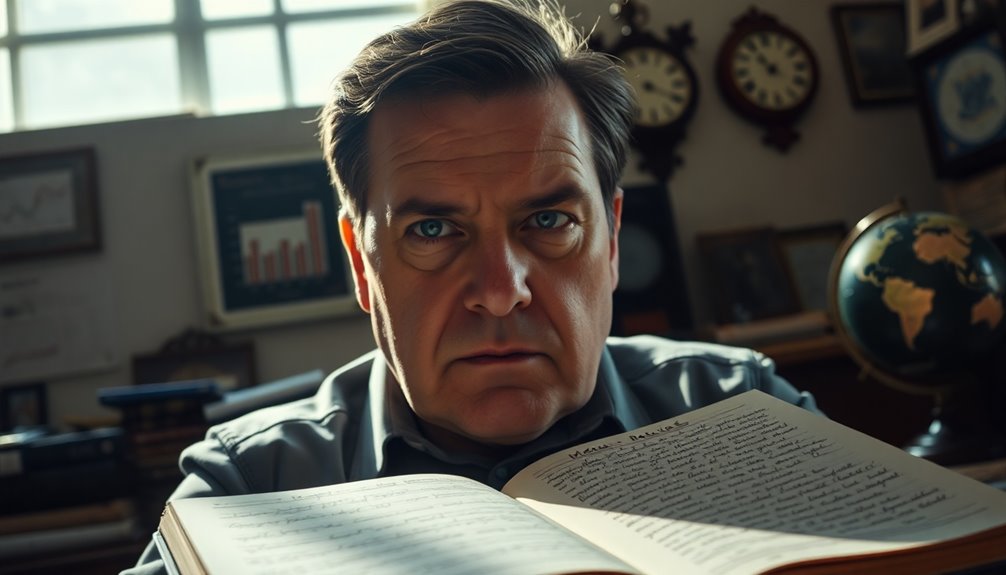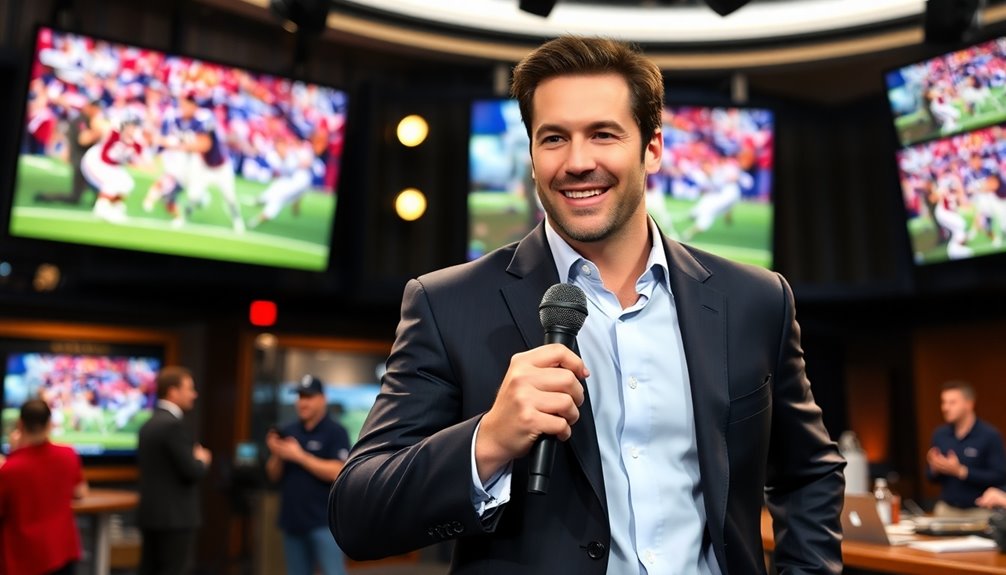Michael Burry, born June 19, 1971, in San Jose, California, is celebrated for predicting the 2008 financial crisis. After graduating from UCLA and earning an M.D., he shifted his focus from medicine to finance in the late 1990s. Burry founded Scion Capital and gained fame for betting against subprime mortgages by creating credit default swaps. His insights led to significant earnings during the crisis, showcasing his contrarian investment philosophy. Burry remains influential, emphasizing rigorous research and market understanding. If you seek a deeper insight into his life and strategies, you won't be disappointed by what you discover next.
Key Takeaways
- Michael Burry, born June 19, 1971, transitioned from medicine to finance, founding Scion Capital in 2000.
- He predicted the 2008 financial crisis by analyzing risks in the subprime mortgage market.
- Burry's strategic use of credit default swaps helped him earn approximately $100 million during the crisis.
- His insights on market psychology and value investing principles have influenced many investors.
- Burry gained fame through Michael Lewis's "The Big Short," highlighting his role in the financial collapse narrative.
Introduction

Michael Burry is a fascinating figure in the world of finance, known for his keen insights and bold investment strategies. Born in 1971, he transitioned from medicine to investing, ultimately founding Scion Capital in 2000. Burry adopted a contrarian approach, focusing on thorough research and value investing principles that set him apart from many in the industry.
His critical analysis of the housing market led him to predict the 2007-2010 subprime mortgage crisis, a prediction that few saw coming. In 2005, Burry strategically purchased credit default swaps, betting against mortgage-backed securities, as he anticipated their collapse. This investment strategy paid off immensely during the financial crisis, resulting in approximately $100 million in personal earnings for him and $725 million for his investors.
Burry's remarkable foresight and success captured widespread attention, particularly through Michael Lewis's book, "The Big Short," where he emerged as a key figure in the narrative of the impending economic downturn. His story is a testament to the power of independent thinking and rigorous analysis in the unpredictable world of finance.
Burry's Early Investment Strategies

Burry's early investment strategies showcased his unique ability to identify undervalued assets and understand market dynamics. In 2000, Michael Burry founded Scion Capital, applying a meticulous, research-intensive approach to value investing. He focused on distressed assets that many investors overlooked, following the principles of Benjamin Graham and David Dodd, which emphasized thorough analysis and risk management.
By 2005, Burry foresaw the impending risks associated with subprime mortgages. He began purchasing credit default swaps (CDS) against mortgage-backed securities, betting on their inevitable decline. This investment strategy was contrarian, as most investors were bullish on the housing market. His keen insights allowed him to navigate the complexities of the financial crisis that unfolded in 2007.
Burry's ability to short high-risk financial products paid off significantly, yielding personal gains of about $100 million and generating $725 million for his investors. His foresight in recognizing the housing market collapse not only highlighted his investment acumen but also solidified his legacy as a visionary in the finance world. Through disciplined research and strategic risk-taking, Burry consistently demonstrated his prowess in value investing.
Burry's Unique Market Predictions

Harnessing a keen analytical mind, Burry accurately predicted the 2008 financial crisis by identifying critical risks associated with subprime mortgages and mortgage-backed securities as early as 2005. His bold investment philosophy involved purchasing credit default swaps against these risky assets, betting against the housing bubble that many ignored. While others saw rising housing prices as a sign of stability, Burry recognized the unsustainable increase—124% from 1997 to 2006—and the deteriorating lending standards fueling the crisis.
His predictions about the impending collapse stemmed from thorough analysis, revealing that mortgage-backed securities rated as safe were actually composed of high-risk loans. This insight not only led to a personal profit of approximately $100 million but also generated $725 million for his investors. Burry's unique market predictions showcased his ability to identify significant market risks that others overlooked.
Ultimately, his foresight and strategic investments contributed to a broader conversation about the need for regulatory reforms in the financial system, highlighting the importance of transparency and accountability in investment practices. Burry's impact on the market remains a testament to his exceptional analytical skills and understanding of financial dynamics.
Frequently Asked Questions

As interest in Michael Burry's strategies and insights grows, many people have questions about his background, investment philosophy, and the impact of his predictions. Born on June 19, 1971, in San Jose, California, Michael Burry initially pursued a career in medicine before transitioning to finance. He founded Scion Capital in 2000, where he developed a reputation for independent thinking and rigorous research.
One of Burry's most significant contributions to the financial market was his early investment in credit default swaps against subprime mortgage-backed securities, which he recognized as a ticking time bomb well before the subprime mortgage crisis unfolded. His foresight allowed Scion Capital to profit immensely, earning over $700 million for investors during the financial turmoil.
Burry's story gained widespread attention through Michael Lewis's book "The Big Short," which showcased his analytical approach and ultimately led to a film adaptation featuring Christian Bale. Despite his success as a hedge fund manager, Burry remains low-profile and emphasizes the importance of thorough research in investment decisions, serving as an inspiration for investors seeking to navigate the complexities of the housing market and beyond.
Burry's Investment Philosophy Insights

A deep dive into Michael Burry's investment philosophy reveals a strong foundation in value investing principles, particularly those from legends like Benjamin Graham and David Dodd. Burry's approach emphasizes rigorous research and independent thinking, focusing on maximizing risk-adjusted returns. He advocates for caution in speculative environments, urging you to understand market dynamics before making financial decisions.
Burry gained fame for his contrarian approach, notably shorting subprime mortgages and identifying inefficiencies in the housing market long before the 2008 crisis. His strategies often involve taking short positions against perceived overvalued assets, such as high-flying tech stocks and ETFs. For instance, his skepticism towards the ARK Innovation ETF and Tesla illustrates his belief in recognizing overvalued assets.
Moreover, Burry highlights systemic risks within financial markets, drawing parallels between Bitcoin's rise and past speculative bubbles. This reinforces his belief in the necessity of risk management in portfolio construction. By utilizing instruments like credit default swaps, he keeps a keen eye on potential pitfalls, reminding you that understanding the intricacies of investment is key to navigating today's complex financial landscape.
Conclusion

Burry's unique perspective on investing serves as a reminder of the importance of vigilance in financial markets. Michael Burry's ability to foresee the subprime mortgage crisis and profit from it highlights the value of rigorous analysis and the willingness to go against the grain. By shorting mortgage-backed securities, he not only secured around $725 million for his investors but also cemented his place in financial history.
His story, popularized in "The Big Short," showcases the challenges of contrarian investing, especially when faced with skepticism from peers and institutions. After the crisis, Burry transitioned from managing a hedge fund to founding Scion Asset Management, where he continued leveraging value investing principles and innovative investment strategies. Burry's journey reflects the essence of cultural intelligence, which is essential for navigating complex market dynamics and fostering collaboration in diverse investment teams.
Burry's insights into market dynamics and risk management remind investors that success often lies in thorough research and a commitment to maintaining one's convictions. His journey emphasizes the need for vigilance and adaptability in an ever-evolving financial landscape. As you navigate your own investment path, keep Burry's lessons in mind—embracing both caution and the courage to challenge prevailing market beliefs can lead to extraordinary opportunities. Additionally, understanding the impact of currency fluctuations on investments can further enhance your strategic approach to investing.
Frequently Asked Questions
Who Predicted the Housing Crash of 2008?
You might want to look at Michael Burry, who identified critical flaws in the subprime mortgage market early on. His insight into rising defaults and falling prices led him to predict the 2008 housing crash accurately.
How Did Michael Burry Lose His Eye?
Michael Burry lost his eye to retinoblastoma, a rare eye cancer, when he was just two years old. The diagnosis led to the removal of his left eye, resulting in him wearing a prosthetic eye.
How Much Did Michael Burry Make From the 2008 Crash?
You'd find that Michael Burry made around $100 million personally during the 2008 crash. His hedge fund generated about $725 million in profits for investors, showcasing his skill in navigating the financial turmoil effectively.
Where Did Michael Burry Get His Money?
You'll find that Michael Burry got his money from personal savings, family contributions, and significant investments from others. His successful value investing strategies helped him grow his assets dramatically, leading to substantial profits over time.









